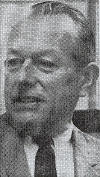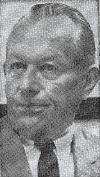| |
 |

|

|
| |
Vaughn Monroe talks about why he quit
the band business 15 years ago. |
What do you do when you've
risen to the top of your profession and you've done everything there is to
do? If you're Vaughn Monroe, you look around for another job. That's just
what he did, 15 years ago. For years a top vocalist-bandleader (on radio
and later television with Camel Caravan), he gave his band notice back in
1953 and went home to New Hampshire (sic) to spend time with his
family. He's in Wichita today doing just what he's been doing the past 15
year-- meeting people, signing autographs and talking a mixture of show
business and electronics, under the auspices of Radio Corporation of
America.
"I JUST got tire of the band
business," he admitted. "We'd played everywhere from Madison Square Garden
to all the big nightclubs, with radio, television and movies in between.
There was really no place else to go." Monroe's association with RCA cam
after he had "retired" as a bandleader. His manager called him to New York
to audition for a series of RCA commercials. "I told him I wasn't an
announcer, but he said the company wanted someone with a casual and homey
touch. At the time, I didn't know four top New York announcers also were
auditioning for the job, or I'd never have agreed to do it. But I won
somehow," he said.
FOR SIX MONTHS, Monroe was the "voice of
RCA" on the Sid Caesar Show. Then a chain of department stores, looking
for someone to "pep up" the re-opening of one store, called RCA to supply
someone, and the company sent Monroe. "I did the usual things--hit all the
newspapers and TV stations in the town (Wilkes-Barre, Pa.) and even did a
radio broadcast from the store window. The chain called me for four more
appearances in other stores, and from that my job with RCA developed."
Today, the singer of such hits as "Ghost Riders in the Sky," "Racing to
(sic) the Moon," and "Caravan" gives speeches to civic clubs about the
future of electronics, makes personal appearances and plays a few band
dates for Shrine organizations, country clubs and other groups. "My band,
of course, is no longer together, but I have four or five bands across the
country I can count on," he said.
ALTHOUGH HE'S official spokesman for RCA,
he is committed to them only 60 days a year; the remainder of the time is
his own. "I've been surprised at the number of bookings available for big
bands," he commented. "There just aren't enough bands to go around." But
the so-called era of the big bands probably will never return. "It wasn't
television that killed it, thought," Monroe said. "It was partly due to
recording companies and partly to radio stations. We used to play five or
six weeks at a big hotel, and the network radio stations would broadcast
us from 10:30 p.m. to 1 a.m. They didn't sign off until that time and,
because they had nothing else to program at that hour, they'd rely on the
big bands.
"THEN ONE DAY," he continued, "somebody
developed the disc jockey and that was the beginning of the end. Radio
realized it could get local sponsorship and make money, so it didn't need
to program us live for nothing. "Then the disc jockey began screaming that
the records were too long (3 to 3 1/2 minutes). They didn't have time for
more than four records per 15 minute segment, and they couldn't get enough
commercials in. So they demanded shorter records. The result was that
there wasn't time in a 2-minute recording for an instrumental passage, and
the bands became merely accompaniments for vocalists. That's when we lost
that medium, " he added. Monroe hasn't made a record for along time, and
"unless the right song comes along, I won't. I just don't care to compete
in the record market today. The teen-agers are buying the 45s and the
adults buy only albums. So unless a good song came along, like "Riders in
the Sky," which had a wide age-range appeal, I wouldn't want to go back to
recording. But I still keep two arrangers in New York and if they advise
me to record a certain song, I probably will." What he'd rather do,
though, is make movies.
"THEY'RE MY FIRST love. At the time I
could have been in Hollywood making films, I still had the band. If I took
time off, it meant the band wasn't making money. "I did take five weeks
off, however, to do a western called "Singing Guns," but the band griped
the whole time because they weren't working. Then I made another, "The
Toughest Man in Arizona," with Henry Fonda, (sic) and as a result,
I was asked to do five more. These weren't "cheapies," either, like Autry
(Gene Autry) was making for $100,000. Each of ours cost a half-million and
had some top stars in them. But the band had more than $1 million in
bookings already lined up, so, although the offer was tempting, I turned
it down.
"IT'S IRONIC that, less than a year after
that, the bottom fell out of the picture business, in '52. Maybe I was
lucky at that, that I didn't sign a movie contract," he added. Monroe
admits that he'd like to do some TV work today, but "my connection with
RCA has somewhat cut down my chances. Sponsors want viewers identifying
with their products rather than with what I represent. Any performer would
be lying if he said he didn't want to do TV--either guest shots or a
series--because television the THE medium in our homes today."
"BUT 15 YEARS with RCA is better than one
season in a television series that flops," he added realistically. Fans of
the big band era-- or of Monroe-- can see him tonight from 7:15 to 9 at
Innes, where he'll be shaking hands and signing autographs before taking
off for a band date Friday at Danville, Ill., and then home "to warmer
weather in Florida."